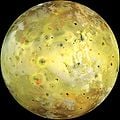Io: Difference between revisions
From Halopedia, the Halo wiki
NightHammer (talk | contribs) mNo edit summary |
AlertFiend (talk | contribs) No edit summary |
||
| Line 33: | Line 33: | ||
*''[[Halo 2]]'' {{Fm}} | *''[[Halo 2]]'' {{Fm}} | ||
*''[[Halo: Uprising]]'' {{Mo}} | *''[[Halo: Uprising]]'' {{Mo}} | ||
*''[[Halo 2 Anniversary]]'' {{Mo}} | *''[[Halo 2: Anniversary]]'' {{Mo}} | ||
**''[[Terminal/Halo 2 Anniversary|Terminals]]'' {{1st}} | **''[[Terminal/Halo 2: Anniversary|Terminals]]'' {{1st}} | ||
==Sources== | ==Sources== | ||
Revision as of 02:20, November 30, 2015
| There is more information available on this subject at Io on the English Wikipedia. |
Io is a moon of the planet Jupiter in the Sol system and the site of a human colony. It is the third largest Jovian moon. During the Human-Covenant War, it was orbited by at least one platform, known as Io Station.[1]
History
Originally discovered in 1610 by Galileo Galilei, Io is the most geologically active object in the Solar System, with over 400 active volcanoes. Humanity began colonizing the Jovian Moons in 2080.[2] In 2160, the Frieden first attacked the United Nations Colonial Advisers on Io, beginning the conflict which soon erupted into the Interplanetary War. Despite being massively volcanic and atmospherically volatile, Io supports a large colony of humans.[3]
The Fleet of Sacred Consecration passed near Io where they were detected by probes from Io Station, just minutes before the Battle of Earth, allowing UNSC forces to muster a timely response.[4] Later in the battle, the station attempted to contact John-117 onboard the Forerunner Dreadnought, passing near Jupiter.[1]
Trivia
The moon was named after Io, a priestess in Greek mythology.
Gallery
List of appearances
- Halo 2 (First mentioned)
- Halo: Uprising (Mentioned only)
- Halo 2: Anniversary (Mentioned only)
- Terminals (First appearance)
Sources
- ^ a b Halo: Uprising, Issue 1
- ^ Halo Encyclopedia, page 44
- ^ Halo Encyclopedia, page 283
- ^ Halo 2, campaign level, Cairo Station

